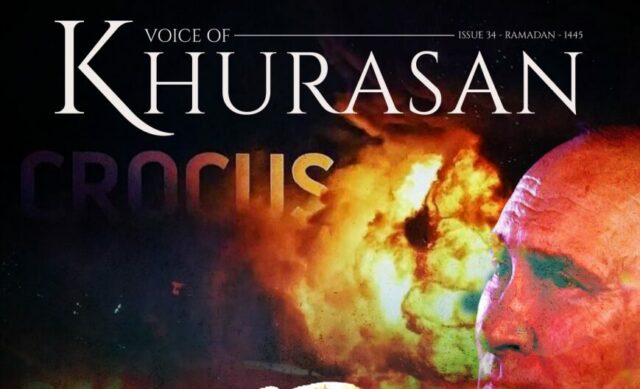
Geopolitical Report ISSN 2785-2598 Volume 41 Issue 10
Author: Giuliano Bifolchi
Executive Summary
On April 8th, 2024, the Al Azaim Foundation, the Islamic State Wilayat Khurasan’s media branch, released the Voice of Khurasan Issue 34 titled “The Bear Bewildered.” This publication analysed the recent terrorist attack in Moscow defined as a ‘retaliation’ and serves as a call to action aimed at mobilising the Muslim Ummah against perceived Western invasions and advocating for the restoration of the Caliphate.
By vilifying democratic systems, particularly in Bangladesh, the propaganda seeks to undermine faith in established governance structures and rally support for the Islamic State’s agenda.
The magazine defined the violent attack at the Crocus City Hall in Moscow a retaliatory measure against the perceived injustices perpetrated by the global coalition, particularly Russia. Through strategic messaging, the Islamic State aims to justify its violent actions and position itself as a defender of Islamic values against external threats.
The Voice of Khurasan Issue 34 – An Overview
The magazine comprises 83 pages of crafted jihadist propaganda, meticulously designed to convey the core messages and communication strategies of the Islamic State. Within its pages, the publication functions as a strategic instrument, highlighting the perceived injustices endured by Muslims and advocating for the establishment of the Caliphate.
Towards the end, a call-to-action urges supporters to contribute to the Islamic State’s cause through various means, accompanied by clear guidelines delineating the expected conduct of supporters.
Notably, the magazine concludes with a stark and direct threat aimed at Europe, symbolised by an image portraying a mujahideen armed with weapons and explosives within the confines of a public transport setting, serving as a menacing reminder of the group’s capability and intent to strike at the heart of Western civilization.
Contents of the magazine:
- A Message for Bangladesh
- Exclusive – The Bear Bewildered
- Allah Will Bring This Matter to Its Consummation
- One from the Best Generation: Fatima
- Status Quo
- Light of Darkness -2
- On the Path of Being a Faithful Servant -2
- If not Now, Then When?
The Voice of Khurasan highlights the recent Bangladeshi national election as a democratic farce in its first pages, urging Muslims to awaken and reclaim their true religion. It portrays the government of Bangladesh as treacherous and corrupt, bowing to external influences rather than adhering to Islamic principles. There is a strong condemnation of democratic systems, labelling them as antithetical to Islam and serving as tools of oppression by “kaffir imperialists.”
By framing the struggle as one between Islam and secular democracy, the magazine attempts to mobilise support for the Caliphate movement, portraying it as the only legitimate authority capable of upholding Islamic principles and protecting the Muslim Ummah.
Read also | Analysis of The Voice of Khurasan First Issue in the Tajik Language |
Terrorism in Moscow and the IS-Khurasan’s Message

The analysis of the article titled “The Bear Bewildered” unveils significant themes surrounding the recent terrorist attack in Moscow. The assault, portrayed as a retaliatory act, is ascribed to the perceived injustices endured by Muslims because of the involvement of the global coalition, with a particular emphasis on Russia’s role in Syria and Iraq.
By targeting the Christians, the attack against the Crocus City Hall in Moscow was a retaliatory measure for the coalition’s actions in al-Baghouz, Syria, where several people died because of airstrikes and bombings. The perpetrators, identified as Islamic State soldiers, perceive themselves as avengers seeking retribution for these alleged atrocities and aim to hold coalition members accountable through similar acts of violence.
The narrative highlights the timing and symbolism of the attack, strategically coinciding with the anniversary of the al-Baghouz massacre. This calculated move serves as a stark reminder to coalition members, particularly the United States, of the enduring consequences of their actions against Muslims. The text also highlights the pervasive fear and apprehension among coalition countries, emphasising the continuous threat as perceived by Western media.
A notable contrast is drawn between the fear instilled by the Islamic State and the perceived indifference towards other jihadist groups among infidel nations. While movements like the Taliban and al-Qaeda claim jihad against infidels, the magazine portrays them as lacking genuine commitment to Islamic values. In contrast, the uncompromising stance and actions of the Islamic State evoke widespread fear among infidels because of their perceived dedication to true jihad.
The attack further exacerbates the ideological chasm between believers and disbelievers. While adherents celebrate the deaths of Crusaders as retribution against perceived oppressors of Muslims, dissenters mourn the loss and condemn the act. The article criticises people who condemn the killing of Crusaders but ignore the atrocities committed by coalition forces, accusing them of selective moral outrage.
Propaganda’s efforts delve into the concept of ‘true Islam,’ endorsing the killing of Crusaders as a righteous act sanctioned by religious doctrine. This portrayal contrasts with a distorted version of Islam attributed to external powers such as the CIA, ISI, and KGB, which prioritise secular interests over divine obedience.
The raid in Moscow is depicted as a manifestation of genuine faith, striking a blow to the pride of infidels and echoing the resilience of historical figures in Islamic conquests, serving as a beacon of hope for oppressed Muslims worldwide.
Risk Assessment
The Voice of Khurasan poses multifaceted risks to regional stability and global security. Firstly, by glorifying violence and framing democratic governments as enemies of Islam, the propaganda may radicalise susceptible individuals and incite acts of terrorism.
This radicalisation could contribute to interfaith tensions and further destabilise regions already grappling with political turmoil. Additionally, the propagation of extremist ideologies undermines efforts to counter terrorism and poses challenges for international security cooperation.
The portrayal of the recent attack in Moscow as a religiously sanctioned act of retribution against Christians has the potential to exacerbate religious tensions and provoke retaliatory violence.
Read also | 6 Questions and Considerations Arising from the Terrorist Attack in Moscow |
For further analysis or reports about terrorism and jihadist propaganda, contact us at info@specialeurasia.com.



